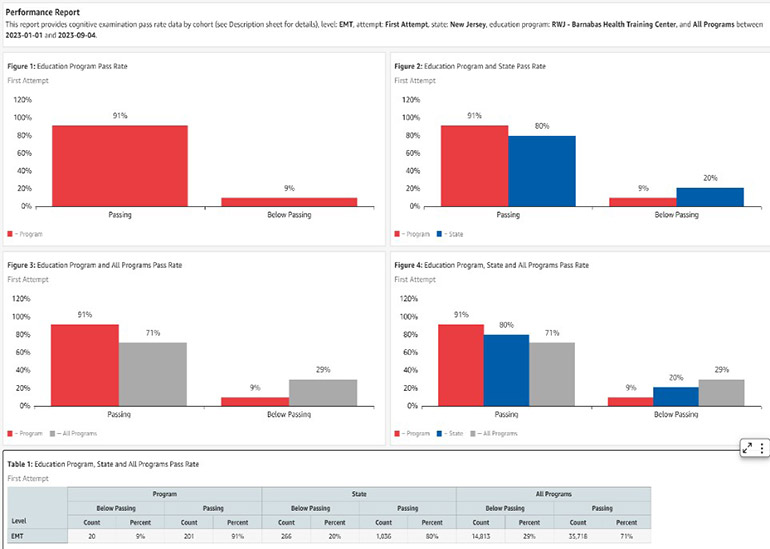Overview of EMT Initial Training
New Jersey EMT initial training is a study intensive course equivalent to the workload of two college courses lasting a minimum of 190 hours. Students should be able to read proficiently at a 10th grade level and will learn to assess and appropriately treat conditions ranging from simple fractures, stroke, and chest pain to critical trauma, cardiac arrest, and childbirth. Students also spend 10 hours of clinical time shadowing nursing staff in one of our RWJBarnabas Health emergency rooms. These hours are scheduled during the course after our students learn patient assessment skills.
RWJBarnabas Health offers a blended learning course that involves students watching interactive lectures and videos at home, participating in live review sessions, and reporting to the classroom to practice hands-on skills with high fidelity manikins. All courses are identical regardless of what day(s) of the week they take place and prepare students for the National Registry EMT exam.
Perspective students often inquire what will be covered in their initial training to become an Emergency Medical Technician. Here is a list of topics embedded within our course and there are skills practice activities that coincide with the coursework.
-
Preparatory
-
Patient Assessment
-
Airway Management
-
Pharmacology
-
Shock and Resuscitation
-
Medical Emergencies
-
Traumatic Emergencies
-
Special Patient Populations
-
EMS Operations
As a new student embarking on your journey to become an Emergency Medical Technician (EMT) at RWJ Barnabas Health, it's crucial to recognize the significance of NREMT first-time pass rates. The NREMT certification is the gold standard in the field of prehospital emergency medical care, and achieving it is the ultimate goal of your EMT program. Here's why these pass rates matter:
-
Quality of Education: EMT programs with high NREMT first-time pass rates typically provide a well-rounded and effective curriculum. They are more likely to have experienced instructors, up-to-date training materials, and a strong focus on hands-on clinical skills development. By choosing such a program, you are investing in a quality education that will prepare you thoroughly for your career.
-
Time and Cost Savings: Failing the NREMT exam on the first attempt can be costly and time-consuming. You may need to pay for the exam again, invest additional time in preparation, and delay your entry into the workforce. Programs with high first-time pass rates help you avoid these setbacks.
-
Confidence and Competence: Passing the NREMT exam on your first try instills confidence in your abilities as an EMT. It affirms that you have the knowledge and skills necessary to provide critical care to patients during emergencies, which can boost your confidence when responding to real-life situations.
-
Career Advancement: Your NREMT certification is just the beginning of your EMT career. As you gain experience and seek career advancement opportunities, a strong foundation built upon a first-time pass can open doors to more advanced roles, such as paramedic or critical care EMT positions.
Here is how we compare Nationally and within the State of NJ:
*Stats from 1/1/2023 through 9/4/2023 RWJBarnabas Health EMT Program in red.

